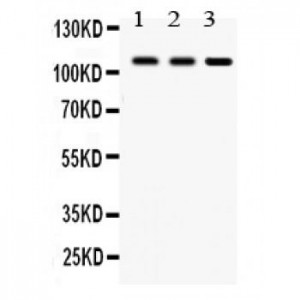More info
Overview
Long Name | Antibody Type | Antibody Isotype | Host | Species Reactivity | Validated Applications | Purification |
| cylindromatosis (turban tumor syndrome) | Polyclonal | IgG | Rabbit | Human, Rat | WB | Immunogen affinity purified. |
Immunogen | ||||||
| E.coli-derived human CYLD recombinant protein (Position: D618-K956). Human CYLD shares 97.6% and 97.9% amino acid (aa) sequence identity with mouse and rat CYLD, respectively. | ||||||
Properties
Form | Lyophilized |
Size | 100 µg/vial |
Contents | Antibody is lyophilized with 5 mg BSA, 0.9 mg NaCl, 0.2 mg Na2HPO4, 0.05 mg NaN3. *carrier free antibody available upon request. |
Concentration | Reconstitute with 0.2 mL sterile dH2O (500 µg/ml final concentration). |
Storage | At -20 °C for 12 months, as supplied. Store reconstituted antibody at 2-8 °C for one month. For long-term storage, aliquot and store at -20 °C. Avoid repeated freezing and thawing. |
Additional Information Regarding the Antigen
Gene | CYLD |
Protein | Ubiquitin carboxyl-terminal hydrolase CYLD |
Uniprot ID | Q9NQC7 |
Function | Protease that specifically cleaves 'Lys-63'-linked polyubiquitin chains. Has endodeubiquitinase activity. Plays an important role in the regulation of pathways leading to NF-kappa-B activation (PubMed:12917689, PubMed:12917691). Contributes to the regulation of cell survival, proliferation and differentiation via its effects on NF-kappa-B activation (PubMed:12917690). Negative regulator of Wnt signaling (PubMed:20227366). Inhibits HDAC6 and thereby promotes acetylation of alpha-tubulin and stabilization of microtubules (PubMed:19893491). Plays a role in the regulation of microtubule dynamics, and thereby contributes to the regulation of cell proliferation, cell polarization, cell migration, and angiogenesis (PubMed:18222923, PubMed:20194890). Required for normal cell cycle progress and normal cytokinesis (PubMed:17495026, PubMed:19893491). Inhibits nuclear translocation of NF-kappa-B. Plays a role in the regulation of inflammation and the innate immune response, via its effects on NF-kappa-B activation (PubMed:18636086). Dispensable for the maturation of intrathymic natural killer cells, but required for the continued survival of immature natural killer cells. Negatively regulates TNFRSF11A signaling and osteoclastogenesis (By similarity). Involved in the regulation of ciliogenesis, allowing ciliary basal bodies to migrate and dock to the plasma membrane; this process does not depend on NF-kappa-B activation (By similarity). |
Tissue Specificity | Detected in fetal brain, testis, and skeletal muscle, and at a lower level in adult brain, leukocytes, liver, heart, kidney, spleen, ovary and lung. Isoform 2 is found in all tissues except kidney. |
Sub-cellular localization | Cytoplasm. Cytoplasm, perinuclear region. Cytoplasm, cytoskeleton. Cell membrane; Peripheral membrane protein; Cytoplasmic side. Cytoplasm, cytoskeleton, microtubule organizing center, centrosome. |
Sequence Similarities | Belongs to the peptidase C19 family. |
Aliases | BRSS antibody|CDMT antibody|Cyld antibody|CYLD gene antibody|CYLD_HUMAN antibody|CYLD1 antibody|CYLDI antibody|cylindromatosis (turban tumor syndrome) antibody|cylindromatosis 1 antibody|Deubiquitinating enzyme CYLD antibody|EAC antibody|HSPC057 antibody|KIAA0849 antibody|MFT antibody|MFT1 antibody|Probable ubiquitin carboxyl terminal hydrolase CYLD antibody|SBS antibody|TEM antibody|turban tumor syndrome antibody|Ubiquitin carboxyl-terminal hydrolase CYLD antibody|ubiquitin specific peptidase like 2 antibody| ubiquitin thioesterase CYLD antibody|Ubiquitin thiolesterase CYLD antibody| Ubiquitin-specific processing protease CYLD antibody|Ubiquitin-specific-processing protease CYLD antibody| USPL2 antibody |
Application Details
| Application | Concentration* | Species | Validated Using** |
| Western blot | 0.1-0.5μg/ml | Human, Rat | AssaySolutio's ECL kit |
AssaySolution recommends Rabbit Chemiluminescent WB Detection Kit (AKIT001B) for Western blot. *Blocking peptide can be purchased at $65. Contact us for more information

Anti- CYLD antibody, ASA-B0540, Western blotting
All lanes: Anti CYLD (ASA-B0540) at 0.5ug/ml
Lane 1: Rat Testis Tissue Lysate at 50ug
Lane 2: Rat Brain Tissue Lysate at 50ug
Lane 3: HELA Whole Cell Lysate at 40ug
Predicted bind size: 107KD
Observed bind size: 107KD
All lanes: Anti CYLD (ASA-B0540) at 0.5ug/ml
Lane 1: Rat Testis Tissue Lysate at 50ug
Lane 2: Rat Brain Tissue Lysate at 50ug
Lane 3: HELA Whole Cell Lysate at 40ug
Predicted bind size: 107KD
Observed bind size: 107KD



